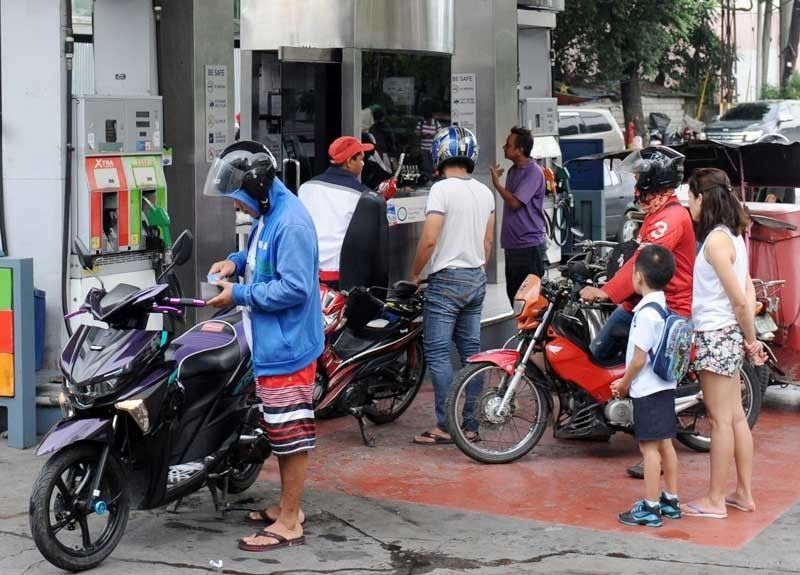2019’s biggest oil price hike tomorrow

MANILA, Philippines — Motorists should brace for significant price hikes as oil companies have announced the biggest increase in pump prices this year.
In a text message, Pilipinas Shell Petroleum Corp. said it would implement an increase of P2.35 per liter on gasoline, P1.75 per liter on diesel and P1.80 per liter on kerosene, effective 6 a.m. tomorrow.
In another text message, Petro Gazz said it would implement the same hike on gasoline and diesel also at 6 a.m. tomorrow.
The major price increases will follow the drone attacks on two major oil facilities of state-run Saudi Aramco in Saudi Arabia last weekend.
The attack cut the kingdom’s output by 5.7 million barrels per day (bpd) or more than five percent of the global oil supply.
Based on the monitoring of the Department of Energy (DOE), the drone attacks caused one of the largest oil spikes in crude oil history.
“Asian crude benchmark soared more than $9 per barrel (up 14 percent) between Sept. 13 and Sept. 17. Reports about potential replacements of lost barrels, however, brought prices lower later in the week. Crude spiked more than $8 per barrel in three days after the attack,” the DOE monitoring said.
This is the second straight week oil companies would be implementing significant price hikes.
Last week, local oil firms raised gasoline prices by P1.35 per liter, diesel by P0.85 per liter and kerosene by P1.00 per liter.
Latest DOE data showed year-to-date adjustments stand at a net increase of P5.51 per liter for gasoline, P4.02 per liter for diesel and P2.01 for kerosene.
Contingency measures
Meanwhile, the DOE has activated a task force to work on establishing contingency measures on oil supply concerns following the drone attacks at Saudi Aramco.
The agency said it has reconvened with the proposed members of the Oil Contingency Task Force (OCTF) to finalize the working draft establishing the interagency working group that would implement the country’s contingency strategies.
The OCTF is activated in preparation for natural or man-made disasters to address the country’s immediate oil supply concerns and, in this case, the impact of the geopolitical and disaster-related events that may cause supply disruptions or sharp volatility in world oil prices.
“We realize the importance of addressing issues beforehand so that the government may have contingency measures to sustain the country’s economic growth and provide basic services to the people. The activation of the OCTF is vital to our resiliency because we are currently dependent on oil imports,” Energy Secretary Alfonso Cusi said in a statement.
Energy Undersecretaries Donato Marcos and Felix William Fuentebella co-chaired the meeting, while Oil Industry Management Bureau (OIMB) director Rino Abad led the presentation on the country’s current oil supply.
Marcos sought inputs from the invitees to be incorporated into the proposed executive order that would formally activate the OCTF.
Key officials and representatives from the Philippine Competition Commission; Departments of National Defense, Trade and Industry, Interior and Local Government, Foreign Affairs, and Justice; and National Security Council were present during the meeting.
In a separate meeting, the DOE called on oil industry players to talk about the effects in world oil prices that may affect the country’s economy.
Discussions revolved around the strict implementation of the Minimum Inventory Requirement (MIR), which is equivalent to stocks of 30 days for oil refiners, 15 days for bulk marketers and seven days for liquefied petroleum gas players.
A proposal to increase the MIR to 60 days was also raised, but the oil representatives stated that the immediate creation of additional infrastructure along with the added logistical demand may prove costly and detrimental to current operations.
As for oil prices, DOE is exploring the possibility of staggering oil price increases as oil companies implement aforementioned increases on gas, diesel and kerosene tomorrow.
While the oil players took note of the proposal, petroleum companies said that based on indicative figures in the world oil market, present pump prices remain lower than 2018 figures even with the 2019 tranche of the Tax Reform for Acceleration and Inclusion Law in effect, and that the country, as a whole, is affected by world oil price volatility.
In the same meeting, the DOE also raised the possibility of preparing oil supply replacement and increasing biofuel blends as an option to mitigate potential supply shortages.
“The DOE is working 24/7 to address these oil-related concerns brought about by the attacks in one of our biggest oil sources in the Middle East. We are reminding everyone to practice energy efficiency measures, like carpooling and the use of public transport, so that we may all contribute to help the nation and the environment,” Cusi said.
Energy security plans
In the wake of the Saudi Aramco drone attacks, the Senate committee on energy is set to review today the government’s energy security plans.
The inquiry was triggered by a resolution filed by Sen. Sherwin Gatchalian, chairman of the committee, who said he wants to look into the DOE’s plans to ensure adequate oil supply in the Philippines following the attacks.
The resolution stated that the committee would look into the short-, medium- and long-term plans of the DOE to achieve energy security and mitigate the adverse repercussions of supply shocks on the country’s oil supply and prices following the attack.
“The DOE, as the primary agency in charge of planning and implementing comprehensive programs for the supply of energy, needs to inform the Filipino public about the effects of the Saudi Aramco attack on oil supply and prices in the Philippines,” Gatchalian said.
“The DOE also needs to state its short- and medium-term plans and strategies to ensure continuous and sufficient supply and reasonable prices amid strains in the Middle East as well as its long-term plans and strategies to achieve energy security in order to prevent vulnerability to supply shocks and insulate consumers from unexpected shortages and sharp price increases,” he added. – With Paolo Romero
- Latest
- Trending




























